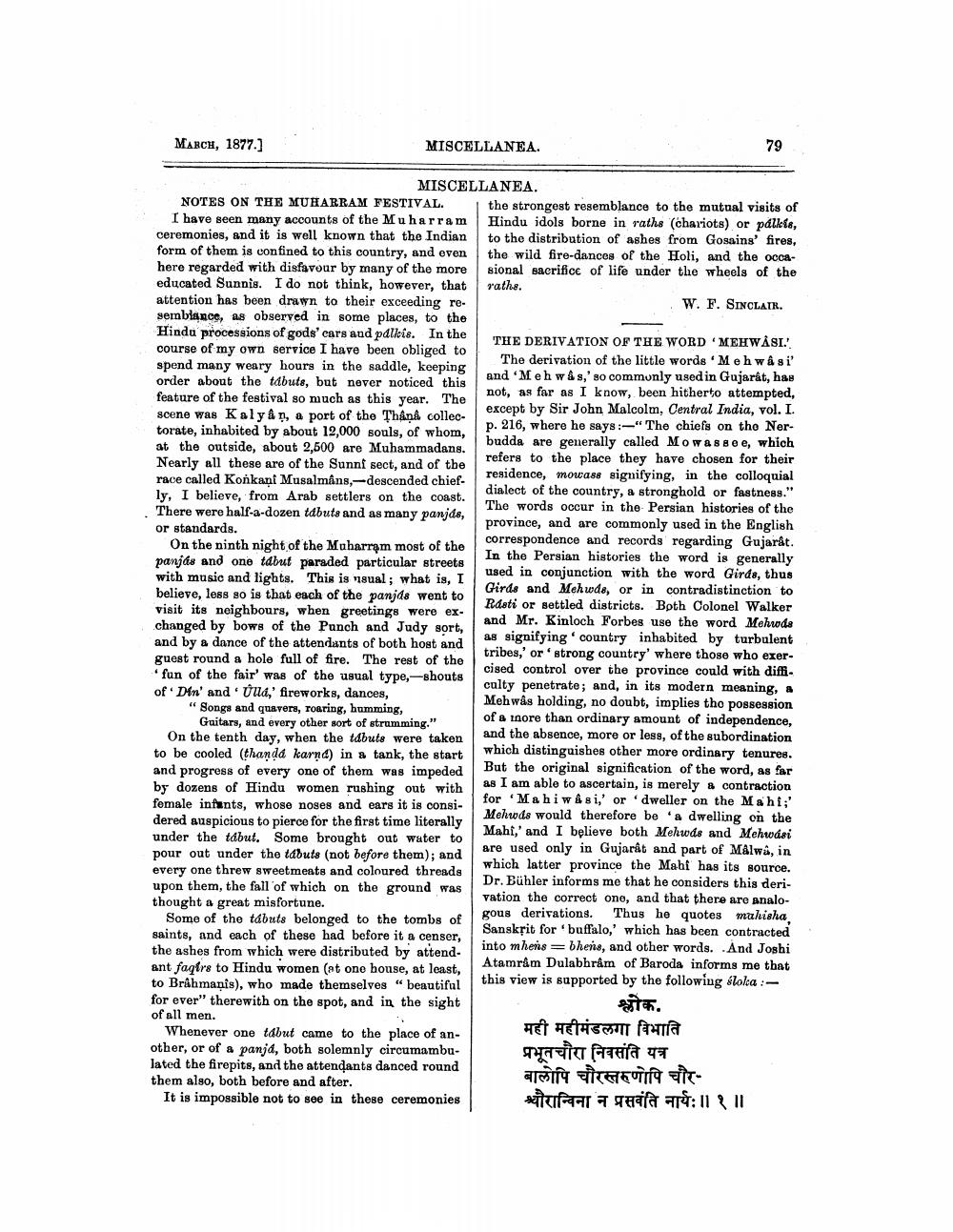________________
MABCH, 1877.)
MISCELLANEA.
79
MISCELLANEA. NOTES ON THE MUHARRAM FESTIVAL. the strongest resemblance to the mutual visits of
I have seen many accounts of the Muharram Hindu idols borne in rathe (chariots) or pallis, ceremonies, and it is well known that the Indian to the distribution of ashes from Gosains' fires, form of them is confined to this country, and even the wild fire-dances of the Holi, and the occahere regarded with disfavour by many of the more sional sacrifice of life under the wheels of the educated Sunnis. I do not think, however, that rathe. attention has been drawn to their exceeding re
W. F. SINCLAIR. semblance, as observed in some places, to the Hindu processions of gods' cars and palicie. In the
THE DERIVATION OF THE WORD 'MEHWÅSI.'. course of my own service I have been obliged to
The derivation of the little words 'Mehwâsi' spend many weary hours in the saddle, keeping
and 'Meh w&s,' so commonly used in Gujarat, has order about the tabuts, but never noticed this
not, as far as I know, been hitherto attempted, feature of the festival so much as this year. The
except by Sir John Malcolm, Central India, vol. I. scene was Kalyan, a port of the Thânå collectorate, inhabited by about 12,000 souls, of whom,
p. 216, where he says:-"The chiefs on tho Ner
budda are generally called Mowassee, which at the outside, about 2,500 are Muhammadans. Nearly all these are of the Sunni sect, and of the
refers to the place they have chosen for their race called Konkani Musalmans,--descended chief
residence, mowass signifying, in the colloquial
dialect of the country, a stronghold or fastness." ly, I believe, from Arab settlers on the coast. There were half-a-dozen tabuts and as many panjds,
The words occur in the Persian histories of the
province, and are commonly used in the English or standards. On the ninth night of the Muharrem most of the
correspondence and records regarding Gujarat.
In the Persian histories the word is generally panjás and one tabut paraded particular streets
used in conjunction with the word Girds, thus with music and lights. This is ngual; what is, I believe, less so is that each of the panjds went to
Girds and Mehwds, or in contradistinction to
Rasti or settled districts. Both Colonel Walker visit its neighbours, when greetings were ex
and Mr. Kinloch Forbes use the word Mehude changed by bows of the Punch and Judy sort, and by a dance of the attendants of both host and
as signifying country inhabited by turbulent guest round a hole full of fire. The rest of the
tribes,' or strong country' where those who exer* fun of the fair' was of the usual type,-shouts
cised control over the province could with diffi.
culty penetrate; and, in its modern meaning, a of Din' and 'Ulld,' fireworks, dances,
Meh was holding, no doubt, implies tho possession "Songs and quavers, roaring, humming,
of a inore than ordinary amount of independence, Guitars, and every other sort of strumming." On the tenth day, when the tabuts were taken
and the absence, more or less, of the subordination to be cooled (thanda karnd) in a tank, the start
which distinguishes other more ordinary tenures. and progress of every one of them was impeded
But the original signification of the word, as far
as I am able to ascertain, is merely & contraction by dozens of Hindu women rushing out with
for Mahiw&si,' or dweller on the Mahi;' female infants, whose noses and ears it is consi
Mehwds would therefore be a dwelling on the dered auspicious to pierce for the first time literally
Mahi,' and I believe both Mehwds and Mehwási under the tdbut. Some brought out water to
are used only in Gujarat and part of Malwa, in pour out under the tabuts (not before them), and
which latter province the Mahf has its source. every one threw sweetmeats and coloured threads
Dr. Bühler informs me that he considers this deriupon them, the fall of which on the ground was thought a great misfortune.
vation the correct ono, and that there are analo
gous derivations. Thus he quotes mahisha Some of the tábuts belonged to the tombs of
Sanskrit for 'buffalo,' which has been contracted saints, and each of these had before it a censer, the ashes from which were distributed by attend.
into mhens =bhens, and other words. And Joshi ant faqers to Hindu women (at one house, at least,
Atamråm Dulabhram of Baroda informs me that to Brahmanis), who made themselves "beautiful
this view is supported by the following blola :for ever" therewith on the spot, and in the sight of all men. Whenever one tabut came to the place of an
मही महीमंडलगा विभाति other, or of a panjd, both solemnly circumambu. प्रभूतचौरा निवसति यत्र lated the firepits, and the attendants danced round them also, both before and after.
बालोपि चौरतरुणोपि चौरIt is impossible not to see in these ceremonies
UEFT T That -r: 1111




